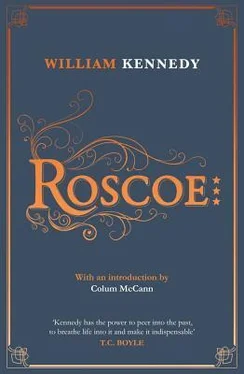“The color of your money,” he said.
“I don’t know how you talked me into this. We wouldn’t be here if Patsy hadn’t won the election.” And she unbuttoned one of four buttons on her shirtwaist.
“Then this must be political, like everything else in life,” said Roscoe, undoing a second button.
She undid the rest and opened the shirtwaist, revealing the lace shoulder straps and lace bodice of her white chemise, the splendid depth of her cleavage, and the northern hemisphere of her sumptuous breasts. Here were the partial but exquisite spoils of political war.
“Do you like the color of my money?”
“Beyond words.” And he kissed her in the latitude of Mexico. She raised his head and rebuttoned the shirtwaist.
“So soon?” he asked.
“It’s a beginning. Now you know what I look like. Why do you want to start with me, Roscoe?”
“I wanted to start before I went in the army. You know that.”
“You never said so.”
“I don’t always act in my own best interests. You’re a full woman, Hattie. You thrill my heart.”
“I have a feeling for you, Roscoe. You’re honest, outside politics. A man should have that.”
“I won’t contradict you.”
“And I like the way you kiss me. You have a knack. That’s a sign a man has paid attention.” And she kissed him again, but would not linger.
“When do I see you?” he asked as she broke the embrace.
“I’ll try to think about that,” she said.
“Do you suppose we’ll get past the chemise next time?”
“It’s been known to happen.” And she unlocked the door and went back to the party.
What did it mean? A certain measure of adventure, and Hattie did find value in him. Something rare seemed to be happening to Roscoe. His life was moving in an upward spiral: political victory, a new Democracy in the offing, restoration of his income, and now the blossoming of something like love. It was too soon to love Hattie, wasn’t it? But this certainly was something akin, and it was coming to him despite his fears, his fraudulence, his profound flaws. He was part of something that wouldn’t be the same without him, whatever it was: Triumvirate? Group? Party? Fusion of patrician and hoi polloi? All were in forward motion with the promise of fruition, a new brotherhood out of the old fatherhood, all, as Roscoe now saw it, an oblique creation of the dead Felix, who said Roscoe was a splendid son, not worth an old man’s piddle; and, in this spirit, Felix was everywhere here tonight, pushing Roscoe into an alliance with bootleggers, making him privy to the twisted glories of politics, and, through political consequence, forcing him to seduce a lovely woman away from his own brewmaster, leaving Roscoe awash in guilt, which he doesn’t accept. Life made me do it, he concluded. I’m innocent. I would never do such things on my own. It’s a trick. It’s a trap to make me powerful, rich, and happy. I don’t trust it.
Et Cetera
On Election Day, 1921, precisely two years after Patsy’s party, the McCall Democrats elected a new mayor of Albany, Henry J. Goddard, an Episcopal banker (Albany City Savings, founded by Lyman Fitzgibbon) who had gone to Albany Academy with Elisha. Patsy’s legend was by this time growing wild in the streets, but he had refused re-election as assessor and retired from public office forever to tend to patronage and, with Bindy, the care and feeding of the city’s drinkers and gamblers. Mush Trainor had proved himself a valuable personal connection for Bindy, who, having drunkenly shot out the lights of a ceiling fixture in a 55th Street speakeasy in Manhattan, a fixture that demanded to be shot out, and having then been blackjacked and trussed with clothesline by bouncers prior to being dumped in an alley who knows how dead, said to his trussers, “Mush Trainor’s my partner,” and off came the clothesline, out came a fresh bottle and glass, and the apology: “You shoulda said so.” And Bindy thereafter smiled inwardly whenever Mush’s name surfaced. A dozen or more people had died in Albany from drinking poison wine and beer, and a pair of Italian immigrant undertakers were convicted of mixing embalming fluid with dago red. Home brew laced with wood alcohol had killed or maimed the innards of numerous indiscreet drinkers, and from this had come the drinker’s test: Pour a little on the sidewalk and light it. If it gives a blue flame, drink it. If it’s yellow, sell it and run. Stanwix continued to produce near beer, and Mush kept pressing Roscoe to up the alcohol content — not a whole lot, Ros. But Ros said no, and the argument continued. Federal agents found barrels of Stanwix stored in cellars and back rooms of thirty presumably defunct Albany saloons, but because the beer was 0.5 percent alcohol, no one was prosecuted.
Cody Gilpin, drinking with Bart Merrigan at the dead end of Patsy’s party, fell off the bar in a stupor and didn’t move. Sam Malley said to Bart, “You don’t leave him here,” and so Bart stood Cody up and walked the wobbly midget to State and Pearl Streets, where they boarded the West Albany trolley for Central and Lexington Avenues, Cody’s stop. But Cody was comatose at Lexington, and Bart the Samaritan sat him on his shoulder when they reached the Watervliet Avenue stop and carried him to his own home, where Bart lived with his mother and maiden aunt, deposited him on the parlor couch, covered him with a blanket, and went to bed. Bart awoke to his mother’s scream and rose from bed to find her hysterical at having found, on her way to the seven o’clock mass, which she had not missed in twenty years, a naked midget asleep on her sofa, snoring, with his little hand clutching his erected little member. Bart, furious with Cody, bundled his clothing and pushed him, and it, out the front door onto the stoop (’What’d I do wrong?” Cody was asking) and was shutting the front door when Roy Osterhout, the beat policeman, seeing the midget emerge onto the stoop naked followed by flying clothing, stopped dead at the vision, trying to understand it, then said to Bart, “You put that whatever it is back in the house, or wherever the hell else it came from.”
Bart then monitored Cody as he dressed in the parlor, walked him to Central Avenue, put him on the West Albany trolley going east toward Lexington, and thought that that was that for Cody Gilpin forever. But Roscoe, responding to Cody’s request for a small job, talked Patsy, later in the week, into hiring Cody to train his young chickens.
Patsy would, before long, marry Flora Pender, and not Mabel Maloy as he thought he would, in the same way Roscoe married Pamela and not Veronica, and Hattie married Louie and not Roscoe. Roscoe confirmed a rendezvous with Hattie at the Malleys’, her choice of location, on the morning after Patsy’s victory party, when she was tidying up the saloon. Together they re-entered the back room, where she had spread a quilt on the floor, and there the chemise barrier fell away. Hattie and Roscoe would continue the affair for twenty-five years, during which Hattie and Louie would marry, cohabit, and separate; she would thereafter marry her third — Jabez Vogel, an engineer on the Delaware and Hudson — also her fourth — Benny (the) Behr, a veterinarian who brought her puppies to play with — and Floyd, the fifth, all without ever defaulting on her ripening love for Roscoe, who loved her in return. Roscoe watched her build her rooming-house empire, which he would find ways to merge with the work of the McCall political machine, in which he had become a key player. Neither he nor Hattie made demands of the other, only affirming from time to time that their love still waxed strong, and that neither of them cared to do without it.
First it was 1921, then 1923, and so on, a serious decade for the development of power, money, eminence, the high life, major trouble, and love, just the beginning.
Читать дальше












